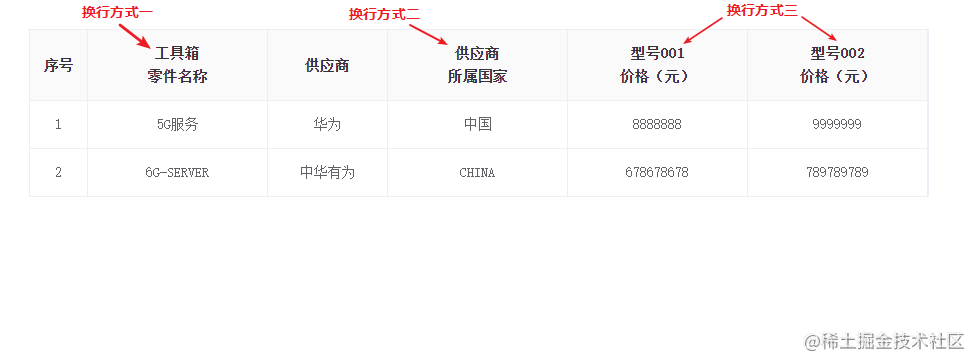详解el-table表头文字换行的三种方式
目录
- 问题描述
- 效果图
- 三种方式的代码
- 总结
问题描述
表格中的表头一般都是不换行的,不过有时候在某些业务场景中,需要让表头的文字换行展示一下,我们先看一下效果图
效果图

三种方式的代码
看注释就行啦。
演示的话,直接复制粘贴运行就行啦
<template>
<div class="vueWrap">
<el-table
style="width: 900px"
:data="tableBody"
border
:header-cell-style="{
background: '#FAFAFA',
color: '#333333',
fontWeight: 'bold',
fontSize: '14px',
}"
>
<el-table-column
type="index"
label="序号"
width="58"
align="center"
></el-table-column>
<!-- 表头换行方式一,使用头部插槽方式,将表头文字拆分在两个div中,因为div盒子是块元素
所以两个div会换行,所以表头就换行了,此方式适用于固定数据的表头换行 -->
<el-table-column prop="toolName" width="180" align="center">
<template slot="header">
<div>工具箱</div>
<div>零件名称</div>
</template>
<template slot-scope="scope">
<span>{{ scope.row.toolName }}</span>
</template>
</el-table-column>
<el-table-column label="供应商" prop="supplier" width="120" align="center">
</el-table-column>
<!-- 表头换行方式二,较之于方式一,这种方式是/n换行符,加css的white-space空白样式控制-->
<el-table-column
:label="labelFn()"
prop="supplierCountry"
width="180"
align="center"
>
</el-table-column>
<!-- 表头换行方式三,动态方式 -->
<el-table-column
v-for="(item, index) in tableHeader"
:key="index"
:label="item.labelName"
:prop="item.propName"
width="180"
align="center"
:render-header="renderheader"
></el-table-column>
</el-table>
</div>
</template>
<script>
export default {
data() {
return {
// 动态数据表头就需要让后端返回来了,让其在需要换行的地方用逗号分隔开
tableHeader: [
{
labelName: "型号001,价格(元)",
propName: "typeOne",
},
{
labelName: "型号002,价格(元)",
propName: "typeTwo",
},
],
// 表体数据
tableBody: [
{
id: "2021111101",
toolName: "5G服务",
supplier: "华为",
supplierCountry: "中国",
typeOne: "8888888",
typeTwo: "9999999",
},
{
id: "2021111101",
toolName: "6G-SERVER",
supplier: "中华有为",
supplierCountry: "CHINA",
typeOne: "678678678",
typeTwo: "789789789",
},
],
};
},
methods: {
labelFn() {
// 在需要换行的地方加入换行符 \n ,在搭配最底下的white-space样式设置
return `供应商\n所属国家`;
},
// 饿了么UI的表头函数渲染方式,这种方式和表头插槽方式有点类似
// 也是把表头的数据文字分割成两块,然后将内容渲染到两个div中(div自动换行)
renderheader(h, { column, $index }) {
return h("div", {}, [
h("div", {}, column.label.split(",")[0]),
h("div", {}, column.label.split(",")[1]),
]);
},
},
};
</script>
<style lang="less" scoped>
/deep/ .el-table th.el-table__cell > .cell {
white-space: pre;
// white-space: pre-wrap; // 也行。
}
</style>
关于white-space不赘述,详情查询官方文档 developer.mozilla.org/zh-CN/docs/Web/CSS/white-space
总结
三种方式各有特色,但是render-header会略为耗费一点点性能。
若为固定表头数据,则优先推荐使用表头插槽方式,其次推荐换行符加css方式。
若为动态数据,则只能使用表头renderheader函数了
到此这篇关于el-table表头文字换行的三种方式的文章就介绍到这了,更多相关el-table表头文字换行的三种方式内容请搜索海外IDC网以前的文章或继续浏览下面的相关文章希望大家以后多多支持海外IDC网!
【原创作者:http://www.1234xp.com/jap.html 转载请说明出处】